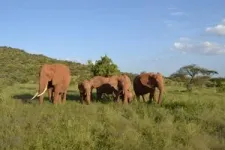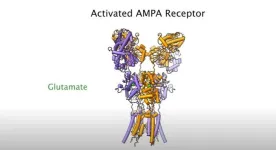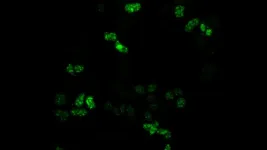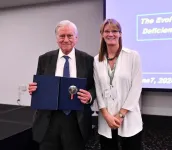(Press-News.org) Colorado State University scientists have called elephants by their names, and the elephants called back.
Wild African elephants address each other with name-like calls, a rare ability among nonhuman animals, according to a new study published in Nature Ecology and Evolution.
Researchers from CSU, Save the Elephants and ElephantVoices used machine learning to confirm that elephant calls contained a name-like component identifying the intended recipient, a behavior they suspected based on observation. When the researchers played back recorded calls, elephants responded affirmatively to calls that were addressed to them by calling back or approaching the speaker. Calls meant for other elephants received less of a reaction.
“Dolphins and parrots call one another by 'name' by imitating the signature call of the addressee,” said lead author Michael Pardo, who conducted the study as an NSF postdoctoral researcher at CSU and Save the Elephants, a research and conservation organization based in Kenya. “By contrast, our data suggest that elephants do not rely on imitation of the receiver's calls to address one another, which is more similar to the way in which human names work.”
The ability to learn to produce new sounds is uncommon among animals but necessary for identifying individuals by name. Arbitrary communication – where a sound represents an idea but does not imitate it – greatly expands communication capability and is considered a next-level cognitive skill.
"If all we could do was make noises that sounded like what we were talking about, it would vastly limit our ability to communicate,” said co-author George Wittemyer, a professor in CSU’s Warner College of Natural Resources and chairman of the scientific board of Save the Elephants.
Wittemyer said that the use of arbitrary vocal labels indicates that elephants may be capable of abstract thought.
What’s in a name?
Elephant and human evolution diverged tens of millions of years ago, but both species are socially complex and highly communicative. Elephants function within family units, social groups and a larger clan structure similar to the complex social networks humans maintain.
Similar needs likely drove development of arbitrary vocal labeling – the naming of other individuals with abstract sounds – in both species, the researchers proposed.
"It's probably a case where we have similar pressures, largely from complex social interactions,” Wittemyer said. “That's one of the exciting things about this study, it gives us some insight into possible drivers of why we evolved these abilities.”
Elephants are talkative, communicating with one another vocally in addition to sight, scent and touch. Their calls convey a lot of information, including the caller’s identity, age, sex, emotional state and behavioral context.
Vocalizations – from trumpeting to low rumbling of their vocal cords – span a broad frequency spectrum, including infrasonic sounds below the audible range of the human ear. Elephants can coordinate group movements over long distances using these calls.
Kurt Fristrup, a research scientist in CSU’s Walter Scott, Jr. College of Engineering, developed a novel signal processing technique to detect subtle differences in call structure, and Fristrup and Pardo trained a machine-learning model to correctly identify which elephant a call was addressed to based only on its acoustic features.
“Our finding that elephants are not simply mimicking the sound associated with the individual they are calling was the most intriguing,” Fristrup said. “The capacity to utilize arbitrary sonic labels for other individuals suggests that other kinds of labels or descriptors may exist in elephant calls.”
Eavesdropping on elephants
Elephants are expressive animals, Wittemyer said, and their reactions are easy to read to those familiar with them. When the researchers played back samples, the elephants responded “energetically” and positively to recordings of their friends and family members calling to them but did not react enthusiastically or move toward calls directed to others, demonstrating that they recognized their names.
How did the elephants react when they discovered they’d been prank called?
“They were probably temporarily confused by the playback but eventually just dismissed it as a strange event and went on with their lives,” said Pardo, now at Cornell University.
The study also found that elephants, like people, don’t always address each other by name in conversation. Calling an individual by name was more common over long distances or when adults were talking to calves.
Research spanned four years and included 14 months of intensive fieldwork in Kenya, following elephants in a vehicle and recording their vocalizations. About 470 distinct calls were captured from 101 unique callers corresponding with 117 unique receivers in Samburu National Reserve and Amboseli National Park.
Could we someday talk with elephants?
The scientists said much more data is needed to isolate the names within the calls and determine whether elephants name other things they interact with, like food, water and places.
"Unfortunately, we can't have them speak into microphones," Wittemyer said, noting the barriers to collecting sufficient data.
New insights into elephant cognition and communication revealed by the study strengthen the case for their conservation, the researchers said. Elephants are classified as endangered, due to poaching for their ivory tusks and habitat loss from development. Because of their size, they need a lot of space and can be destructive to property and hazardous to people.
While conversing with pachyderms remains a distant dream, Wittemyer said that being able to communicate with them could be a gamechanger for their protection.
"It's tough to live with elephants, when you're trying to share a landscape and they're eating crops," Wittemyer said. “I'd like to be able to warn them, ‘Do not come here. You're going to be killed if you come here.’”
END
Elephants have names for each other like people do, new study shows
2024-06-10
ELSE PRESS RELEASES FROM THIS DATE:
In a significant first, researchers detect water frost on solar system’s tallest volcanoes
2024-06-10
PROVIDENCE, R.I. [Brown University] — An international team of planetary scientists has detected patches of water frost sitting atop the Tharsis volcanoes on Mars, which are not only the tallest volcanic mountains on the Red Planet but in the entire solar system.
The discovery marks the first time frost has been spotted near the planet’s equator, challenging existing perceptions of the planet’s climate dynamics, according to the team’s new study in Nature Geoscience.
“We thought it was improbable for frost to form around Mars’ equator, as the mix ...
Super-chilled brain cell molecules reveal how epilepsy drug works
2024-06-10
FOR IMMEDIATE RELEASE
By super cooling a molecule on the surface of brain cells down to about minus 180 degrees Celsius — nearly twice as cold as the coldest places in Antarctica — scientists at Johns Hopkins Medicine say they have determined how a widely-used epilepsy drug works to dampen the excitability of brain cells and help to control, although not cure, seizures.
The research, published June 4 in Nature Structural & Molecular Biology, identifies critical connections between activity of the epilepsy drug ...
Benefits of failure are overrated
2024-06-10
The platitude that failure leads to success may be both inaccurate and damaging to society, according to research published by the American Psychological Association.
Researchers conducted 11 experiments with more than 1,800 participants across many domains and compared national statistics to the participants’ responses. In one experiment, participants vastly overestimated the percentage of prospective nurses, lawyers and teachers who pass licensing exams after previously failing them.
“People expect success to follow failure much more often than it actually does,” said lead researcher Lauren Eskreis-Winkler, PhD, an assistant ...
NUTRITION 2024 showcases groundbreaking research on what we eat and why it matters
2024-06-10
Don’t miss your chance to be among the first to hear breaking news in food and nutrition science at NUTRITION 2024. The annual flagship meeting of the American Society for Nutrition will be held June 29–July 2 at McCormick Place in Chicago.
Reporters and bloggers are invited to explore the meeting schedule and register for a complimentary press pass to attend.
The meeting will feature stimulating discussions, exciting research announcements and updates from groups shaping the nutrition and health policies that affect us all. Highlights include:
Diet and exercise performance – As the ...
Icahn School of Medicine at Mount Sinai awarded $21 million NIH grant to advance understanding of aging-related hormone
2024-06-10
New York, NY [June 10, 2024]—Researchers at the Icahn School of Medicine at Mount Sinai have been awarded a $21 million grant from the National Institute on Aging (NIA) of the National Institutes of Health (NIH), to further advance understanding of an aging-related hormone known as follicle-stimulating hormone (FSH), including its potential role in obesity, osteoporosis, and Alzheimer’s disease. The work could lead to the development of new treatments for these and other conditions involving aging.
This is a collaborative ...
RNA splicing’s spotters
2024-06-10
Bodybuilders and cellular mechanisms agree generating protein is a heavy lift. To complete the task, cells rely on complexes called spliceosomes. These molecular machines snip extra bits out of our genes’ RNA copies and piece together precise instructions for protein-building. When the splicing process goes awry, it can result in diseases like cancer or spinal muscular atrophy. Cold Spring Harbor Laboratory (CSHL) Professor Adrian Krainer helped develop the first FDA-approved treatment for this devastating genetic disorder. Now, his team has discovered that two important regulator proteins work together ...
Clinical trial shows promising results in a two-drug combination that curbs methamphetamine use
2024-06-10
A clinical trial on a two-drug therapy for methamphetamine use disorder reduced use of the highly addictive drug for up to 12 weeks after initiation of treatment, UCLA-led research suggests.
Participants in the ADAPT-2 clinical trial who received a combination of injectable naltrexone plus extended-release oral bupropion (NTX+BUPN) had a 27% increase in methamphetamine-negative urine tests, indicating reduced usage. By contrast, the placebo group had an 11% increase in negative tests.
The study will be published in the peer-reviewed journal Addiction.
“These ...
Gut microbes from aged mice induce inflammation in young mice, study finds
2024-06-10
CHAMPAIGN, Ill. — When scientists transplanted the gut microbes of aged mice into young “germ-free” mice — raised to have no gut microbes of their own — the recipient mice experienced an increase in inflammation that parallels inflammatory processes associated with aging in humans. Young germ-free mice transplanted with microbes from other young mice had no such increase.
The findings suggest that changes to the gut microbiome play a role in the systemwide inflammation that often occurs ...
Valentin Fuster, MD, Ph.D., received 2024 Distinguished Award from European Society for Clinical Investigation (ESCI)
2024-06-10
The European Society for Clinical Investigation (ESCI) is awarding Valentin Fuster, MD, PhD, President of Mount Sinai Heart and Physician-in-Chief of The Mount Sinai Hospital, its ESCI Distinguished Medal for 2024. He received this honor during the ESCI Annual Scientific Meeting in Barcelona, Spain, during a special ceremony on Friday, June 7.
The ESCI Medal is awarded yearly for outstanding achievements in clinical investigation and for the teaching of young scientists and medical specialists.
This prestigious recognition highlights Dr. Fuster’s significant contributions to the worldwide field of cardiology. Dr. Fuster’s work has been ...
Planetary Health Diet associated with lower risk of premature death, lower environmental impact
2024-06-10
Embargoed for release: Monday, June 10, 7:00 AM ET
Key takeaways:
People whose diets most closely adhered to the Planetary Health Diet (PHD) had 30% lower risk of premature death compared to those with the lowest adherence.
Every major cause of death, including cancer, heart disease, and lung disease, was lower with greater adherence to this dietary pattern.
Diets adhering to the PHD pattern had substantially lower environmental impact, including 29% lower greenhouse gas emissions and 51% less land use.
Boston, MA—People who eat a healthy, sustainable diet may ...







